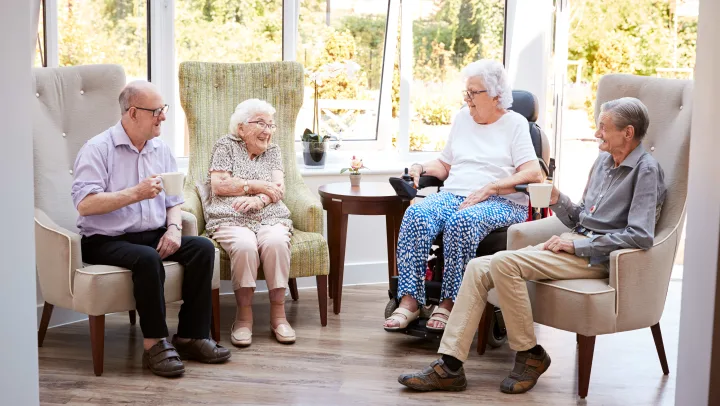Locating the Right Assisted Living Option for Tailored Memory Treatment Programs
The procedure of picking a suitable assisted living solution for tailored memory care programs requires a nuanced understanding of individual requirements, particularly as they connect to cognitive impairments such as Alzheimer's and mental deterioration. It is essential to analyze not only the certifications of the team however also the schedule of individualized care strategies that deal with the particular challenges homeowners deal with. Furthermore, the impact of appealing activities and an encouraging neighborhood can not be overstated. As we discover these elements, the inquiry stays: what truly comprises an ideal environment for memory treatment?
Comprehending Memory Treatment Requirements
Understanding the special memory treatment needs of individuals with cognitive problems is critical for offering efficient assistance and enhancing lifestyle. Cognitive disabilities, including Alzheimer's illness and various other forms of dementia, significantly influence a person's ability to process info, connect, and maintain self-reliance. Therefore, customized approaches are vital in addressing these difficulties.
People with memory problems frequently experience confusion, mood changes, and disorientation, necessitating a supportive and structured environment. Memory care programs ought to concentrate on developing a secure room that urges social communication, cognitive involvement, and psychological health. This can be achieved with specialized activities, such as memory games, art therapy, and reminiscence sessions, which promote cognitive excitement and preserve personal identification.

Examining Team Qualifications
The certifications of personnel in memory treatment programs are important to delivering high-grade support for people with cognitive impairments. Reviewing staff credentials involves evaluating both instructional history and functional experience in senior citizen care, especially in memory-related problems such as Alzheimer's and other forms of mental deterioration.
Look for personnel that have relevant accreditations, such as Licensed Mental Deterioration Practitioner (CDP) or specialized training in memory care. These credentials show a commitment to comprehending the intricacies of cognitive decline and reliable communication methods tailored to residents' special demands. In enhancement, inquire about ongoing training opportunities that team participants participate in, as continuous education is crucial in an area that advances rapidly with new research and best practices.
Moreover, assess the staff-to-resident proportion, as this directly influences the top quality of care. Inevitably, a well-qualified group is critical in fostering an environment that improves the dignity and quality of life for people in memory care.
Significance of Personalized Care Program
Customized care strategies play an important duty in boosting the well-being of people in memory care programs. These strategies are tailored to the distinct needs, choices, and click now abilities of each citizen, guaranteeing that treatment is both pertinent and efficient. By considering aspects such as medical history, cognitive feature, and individual passions, caregivers can produce a comprehensive strategy that promotes self-respect and regard for each individual.
The importance of customized treatment strategies expands beyond basic care requirements; they cultivate a complacency and familiarity, which is essential for individuals experiencing memory challenges. By attending to certain behavior patterns and psychological reactions, caretakers can apply strategies that decrease anxiety and improve total lifestyle.
Furthermore, customized care plans promote much better interaction amongst personnel, household members, and health care suppliers. This joint strategy makes certain that every person entailed is notified and lined up in their treatment initiatives, causing more consistent and reliable assistance. Ultimately, a well-structured personalized treatment strategy is necessary in memory care programs, as it not only improves everyday living experiences however also contributes to the long-term wellness and happiness of residents.
Involving Tasks and Programs

Activities such as art therapy, songs sessions, and reminiscence treatment give opportunities for self-expression and cognitive involvement. These deliberate communications not just assist in protecting cognitive capacities however likewise use psychological benefits, reducing sensations of isolation and anxiousness that typically go along with memory loss.
In addition, structured group activities can motivate socialization, which is critical for psychological wellness - Memory Care. Regular engagement in games, exercise classes, and community outings produces an environment of sociability and assistance. Customized programs that take into consideration individual passions and histories further improve interaction, making tasks much more meaningful and reliable
Incorporating innovation, such as memory video games and virtual fact experiences, can additionally offer to enhance the lives of locals, supplying ingenious ways to promote cognitive function. Ultimately, a concentrate on appealing tasks and programs is crucial for fostering an encouraging environment that advertises alternative well-being in memory treatment settings.

Assessing Neighborhood Atmosphere
When reviewing a community setting for memory treatment programs, it is critical to think about aspects that contribute to the general wellness and security of locals. The physical design of the neighborhood must focus on availability and navigating, minimizing barriers while giving clear signs and familiar sites. A safe and secure setting is vital to stop homeowners from wandering, which can posture safety and security risks.
Furthermore, the sensory aspects of the community, such as lights, color pattern, and sound levels, play a considerable duty in enhancing convenience and reducing anxiety among residents. Natural light and exterior areas promote engagement with nature, cultivating a relaxing atmosphere that can profit cognitive function.
Another vital aspect is the schedule of qualified staff that comprehend the special requirements of people with memory disabilities. Staff needs to be geared up to develop a caring atmosphere that urges social communication and psychological support.
Finally, the sense of area and belonging is vital. Involving family involvement and opportunities for locals to form connections with peers can considerably boost their total quality of life. Assisted Living. By very carefully assessing these elements, families can make enlightened decisions about the most appropriate memory care community for their enjoyed ones
Final Thought
Finally, picking a suitable assisted living solution for tailored memory treatment programs requires an extensive analysis of private demands and preferences. Focusing on team qualifications, individualized care strategies, engaging activities, and an encouraging area setting is necessary for enhancing the high quality of life for residents dealing with cognitive obstacles. By dealing with these essential aspects, families can make sure that their enjoyed ones receive the needed assistance and like promote psychological wellness and cognitive excitement in a nurturing setup.